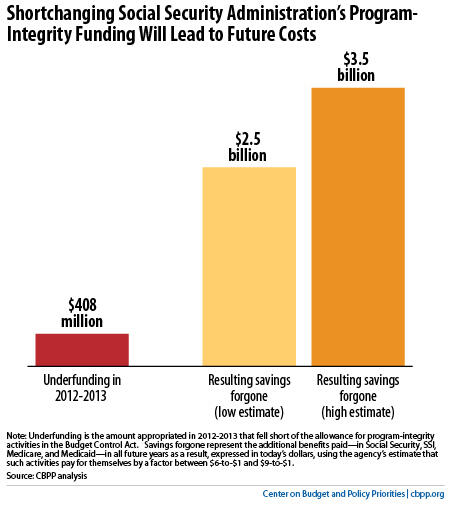BEYOND THE NUMBERS
Bloomberg’s Evan Soltas correctly points out that Congress could do more to fund “program-integrity” efforts across the federal government, including at the Social Security Administration (SSA). We have long agreed (see here and here.) At SSA, such funding pays for efforts to weed out improper benefit payments in Social Security disability insurance (DI) and Supplemental Security Income (SSI) — efforts that more than pay for themselves and don’t compete with other worthwhile priorities.
As we’ve explained, the 2011 Budget Control Act (BCA) allows Congress to provide a specified amount of extra funding each year for certain program-integrity activities. These special funding increases don’t require offsetting cuts in other non-defense programs; in effect, they’re outside the BCA’s annual caps on discretionary funding.
At SSA, the extra money pays for reviews of SSI recipients’ financial status (to ensure that they’re still eligible for benefits) and for “continuing disability reviews” in both DI and SSI (to end payments to beneficiaries who’ve recovered from their impairments).
Continuing disability reviews shrink eventual benefit payments by over $9 for every $1 they cost, according to the SSA actuaries. The payoff of SSI financial redeterminations is only slightly lower, an estimated $6 for every $1 in costs. In short, these efforts reduce the deficit.
Congress nevertheless failed to take full advantage of the BCA in 2012, authorizing just $483 million of the allowable $623 million. (That extra allowance comes on top of the $273 million annually that SSA must spend out of its “core” budget before it can spend any of the extra money.) Congress authorized $483 million in 2013 as well, even though the BCA allowed up to $751 million.
In sum, Congress has underfunded SSA’s program-integrity work by over $400 million over the past two years. Over the long run, we’d expect that to cost $2.5 billion to $3.5 billion in unnecessary benefit costs (see graph).

President Obama unsuccessfully sought the full amount of program-integrity funding in both years. For 2014 and beyond, he’s trying a different tack — removing such funding entirely from the appropriations fray and turning it into “mandatory” funding that doesn’t depend on annual action by Congress. (For the Congressional Budget Office’s analysis, see here.) But Congress hasn’t acted on that proposal.
Program-integrity activities are a sensible, money-saving step that Congress has neglected. Soltas is right: starving the watchdogs is bad policy.
